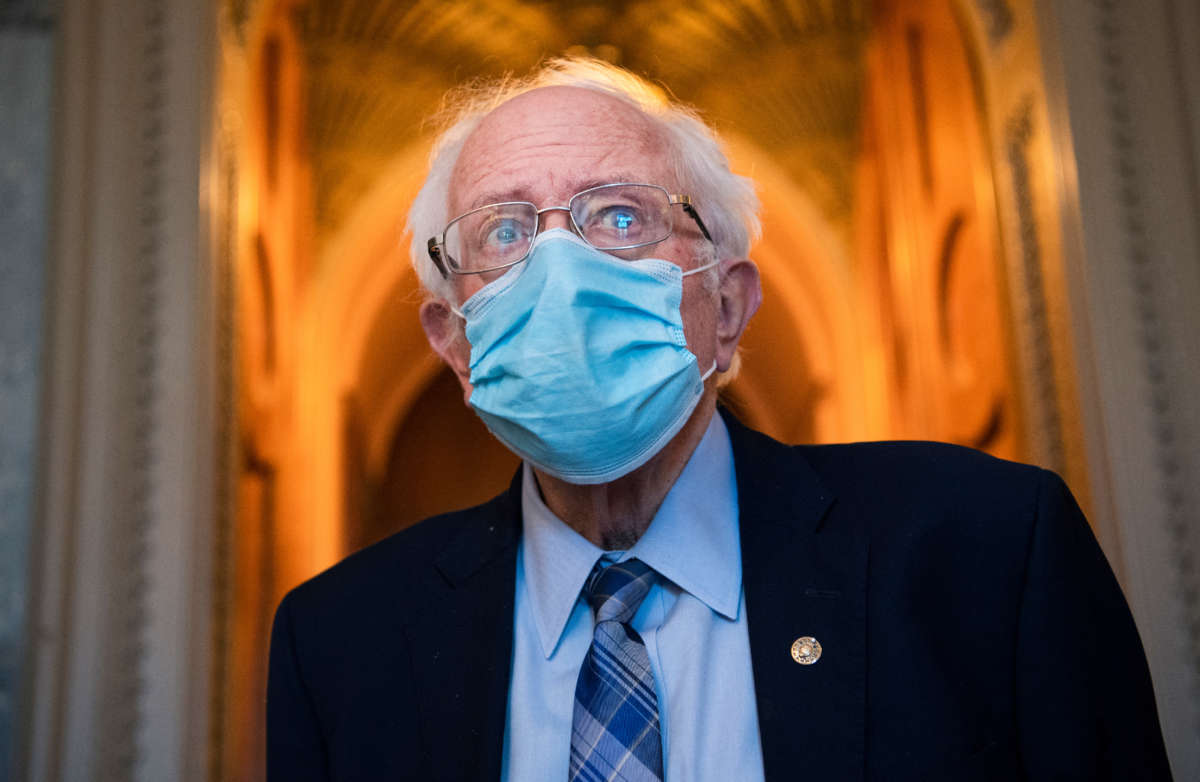Honest, paywall-free news is rare. Please support our boldly independent journalism with a donation of any size.
Progressives are vowing to continue to fight for the passage of a $15 federal minimum wage after the Senate omitted the popular measure from President Joe Biden’s $1.9 trillion COVID-19 relief bill, which passed Saturday.
“If any Senator believes this is the last time they will cast a vote on whether or not to give a raise to 32 million Americans, they are sorely mistaken,” tweeted Sen. Bernie Sanders (I-Vermont). “We’re going to keep bringing it up, and we’re going to get it done because it is what the American people demand and need.”
Though the minimum wage proposal currently faces more opposition in the Senate, progressive representatives in the House echoed Sanders’s sentiment. “I will never stop fighting to make the minimum wage a living wage,” said Rep. Pramila Jayapal (D-Washington). “It’s long overdue that we give 32 million workers a raise and lift a million people out of poverty.”
On Friday, eight Democratic senators drew progressive ire as they voted against the inclusion of the $15 federal minimum wage raise in the American Rescue Plan, Biden’s first coronavirus stimulus package. The proposal was raised by Sanders and was defeated 58-42, with all Republicans voting against it.
The proposal’s most vocal opponents within the Democratic Party were Senators Joe Manchin (D-West Virginia) and Kyrsten Sinema (D-Arizona). But on Friday, they were joined by Tom Carper (D-Delaware), Chris Coons (D-Delaware), Jeanne Shaheen (D-New Hampshire), Maggie Hassan (D-New Hampshire), Jon Tester (D-Montana) and Angus King (I-Maine), who caucuses with Democrats.
Sinema, in particular, drew ire after a video clip showed her seemingly gleeful thumbs-down vote. In response, Sinema’s office claimed that it was sexist to criticize her over her casual body language, but many pushed back against that notion, arguing instead that her vote was sexist since women disproportionately suffer from poverty.
Did Sinema really have vote against a $15 minimum wage for 24 million people like this? pic.twitter.com/Jv0UXLKLHI
— Sawyer Hackett (@SawyerHackett) March 5, 2021
The Senate passed the stimulus package over the weekend. The bill will now go back to the House for another vote, since it’s slightly modified from when the House approved it. The vote is expected on Tuesday, and if it passes, as expected, it will be sent to Biden.
The package passed by the Senate included another last-minute concession to centrists: Unemployment checks were cut down from $400 to $300 a week, which was a proposal backed by Manchin and King. Last week, centrists also won further restrictions on the $1,400 stimulus checks.
Despite these concessions, the Congressional Progressive Caucus, led by Jayapal, was optimistic about the passage of the package. “The Congressional Progressive Caucus worked very hard to ensure that the package that the House passed was as bold as it needed to be,” said Jayapal in a statement. Though the $15 wage was cut from the Senate version of the bill, “We are proud of our efforts and know that had we not passed such a bold package in the House, the resulting bill would have been far worse,” Jayapal said.
From here, the $15 minimum wage fight faces a tough fight. The proposal’s biggest hurdle is the filibuster in the Senate, which requires most bills to have 60 votes to end discussion or debate on a bill — a virtual impossibility with the Republican Party’s hold on 50 seats.
Democrats and progressives have been advocating for the abolishment of the filibuster, a move which moderate Democrats like Manchin and Sinema have stood against. However, over the weekend, Manchin said that he’d be open to filibuster reform, giving hope yet to progressives.
Media that fights fascism
Truthout is funded almost entirely by readers — that’s why we can speak truth to power and cut against the mainstream narrative. But independent journalists at Truthout face mounting political repression under Trump.
We rely on your support to survive McCarthyist censorship. Please make a tax-deductible one-time or monthly donation.
